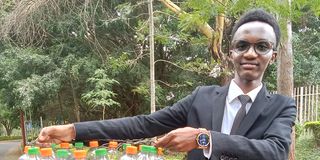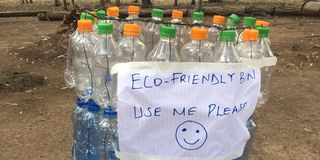From waste to worth: Turning plastic trash into dustbins

Daniel Musembi, a student at Kenyatta University, lifts a dustbin made from plastic bottles.
What you need to know:
- The cost of producing each bin differs depending on size, design and materials used.
- However, the club strives to minimise production costs by sourcing the materials from waste.
Plastic bottles don’t necessarily belong in the trash. At least not at Kenyatta University, where students are turning plastic waste into treasure through an eco-friendly initiative dubbed the Kijani Bin Project.
The students are on a mission to transform plastic waste into valuable resources to create a cleaner and greener future for the university and the country in general. This comes against the backdrop of a stark environmental challenge as countries grapple with overwhelming reliance on single-use plastics.
Kenyatta University-United Nations Educational, Scientific and Cultural Organisation Club (KU-UNESCO) reuses plastic bottles to make dustbins. Though the project is in the prototype stage, several bins are already in use at the university. The bin, regarded as a masterpiece, is made of 60 plastic bottles, wires and a sturdy metallic base.

The ‘Kijani Bin’ that is in use at Kenyatta University.
Daniel Musembi, 19, the managing director of KU-UNESCO, believes that this initiative will be a game changer in environmental conservation. “Instead of throwing plastic bottles haphazardly, we are setting up garbage collection centres in the university’s environs, where we will be collecting the bottles,” he said. “For us to save the Earth, we should collaborate to manage waste.”
KU-UNESCO has been an active club at Kenyatta University since September 2020.It is recognised by the Kenya Federation of UNESCO Clubs and Associations. “We established this organisation with the aim of creating awareness about the 17 Sustainable Development Goals (SDGs), partnerships for the SDGs, climate and environmental ambassadorship,” noted Daniel, a second-year student pursuing Bachelor of Environmental Science.
His assistant, Adam Furaha, who studies Environmental Studies and Resource Conservation, is at the forefront of the project.
“The club has carried out various projects within the university and its environs such as waste management, innovation, health and well-being projects, and SDG advocacy,” Adam told Healthy Nation.
This is done through sub-clubs, where the members visit high schools to create awareness on environmental conservation, engage in regular cleanups and host mental health awareness talks and walks.
Also, the club identifies one SDG every semester to focus on; for instance, zero hunger. Adam noted that they normally visit children’s homes and distribute foodstuffs.
The student-led organisation with 124 members also focuses on art, culture and digital literacy.
Creation of wall murals to communicate messages promoting environmental protection and taking part in the commemoration of cultural days have helped them achieve their mandate.
Globally, plastic waste has become one of the biggest threats to the environment due to its implications on human health, sanitation and marine life.
According to the United Nations Environment Programme (Unep), up to 20 per cent of solid waste in Kenya is comprised of plastic waste.
These plastics account for more than 15 per cent of greenhouse gas emissions, increasing global warming rates.
“This served as an inspiration for us to delve into waste management with a specific focus on plastic waste,” Daniel said.
“The motivation for the project also stemmed from our commitment to finding creative solutions to environmental challenges while also promoting sustainability.”
The Kijani Bin Project is currently in its prototype phase, with plans underway to include a lid to shield it from weather elements such as rain.
“The raw materials for the bin—plastic bottles, binding wire and adhesive materials—are readily available,” remarked Daniel.
He noted that the cost of producing each bin differs depending on size, design and materials used.
However, the club strives to minimise production costs by sourcing the materials from waste.
“Plans are underway to establish collection centers for plastic bottles, where, depending on the number of bottles a customer brings, we shall give them the dustbins at a discounted price,” noted Adam.
KU-UNESCO's main target end users include educational institutions, public spaces and organisations.
Daniel said their initiative serves as an inspiration to young people to embrace climate-smart innovations.
They believe in building awareness around environmental conservation, emphasising that protecting the planet is more than just planting trees.
The bins are currently being used at the Green Education Hub at Kenyatta University and in other university departments.
“These bins attract a lot of attention when we carry them around. Many people want to learn how to create such a masterpiece.”
Adam said they are also creating sustainable art from waste and decorating glass bottles.
The initiative has enjoyed support from a number of organisations, some of which are domiciled at the university.
Identified as an important agent in addressing the plastic waste crisis, the students have been supported by the Climate-U network. This network brings together universities from around the world committed to researching in a bid to mitigate the climate crisis.
Climate-U held the hands of KU-UNESCO in patenting, designing blueprints and providing the required materials.
Daniel is appealing to both the county and national governments to support the initiative.





